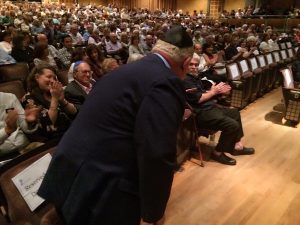MONTREAL – Few compliments resonate more with Jewish parents than hearing that others view their child as a mensch.
At Hebrew Academy’s elementary school the development of good character is viewed as a goal to be achieved as much as academic excellence.
Led by school counsellor Jillian Rudnitsky and rabbi-educator Rabbi Eddie Shostak, the “Be a Mensch” project encourages children to recognize admirable traits in their peers and take pride in their own strengths and virtues through the awarding of special cards that are sported as badges of honour.
“The energy shift that is felt when someone acknowledges a positive value in someone else is incredible and it helps strengthen relationships,” said Rudnitsky.
READ: HAVE YOU HAD ENOUGH JEWISH STUDIES BY GRADE 8?
Be a Mensch focuses on nine qualities: bravery, curiosity, compassion, teamwork, perseverance, creativity, humour, gratitude and being pleasant. Each is printed on a card with an accompanying definition.
One who exemplifies bravery, for example, “show[s] courage by not shrinking from threat, challenge, difficulty, or pain. You speak up for what is right even if there is opposition. You act on what you believe in.
“A key component of the program is to teach students the Jewish roots of these universal values and that good behaviour is a Jewish religious value,” said Rabbi Shostak, who ascribed Torah-based verses to each trait and chose an expression from Ethics of the Fathers, a compilation of ethical teachings from the Mishnaic period (273 BCE–190 CE).
For bravery, for instance, the verse is: “Who is strong? He who conquers his evil inclination.
“Our hope is that by involving all the students, faculty and staff, the children will recognize that being a mensch is not limited to a select group. Rather, these are universal values rooted in Torah that span across age, gender, and people,” said Rabbi Shostak.
Rudnitsky and Rabbi Shostak visited all classes to introduce Be a Mensch and put up posters around the school. The following week, all students were given badge holders, and participants continued to wear them for the program’s duration. Teachers integrated the values within their lessons, and the library even circulated values-themed books.
Rudnitsky and Rabbi Shostak stressed that this was not a competition. “This is not about how many cards you get by the end of the week. There is no winner.”
The co-ordinators also asked teachers to make sure students were not simply awarding cards to their friends, and that no child was left out.
Teamwork was among the values cards earned by Grade 4B student Reuven Drazin. “I was playing soccer at recess and my friend saw that I was encouraging another player during the game. I said to [the player,] ‘it’s OK if you didn’t get a goal, you’ll get a goal next time.’ And he did,” said Drazin.
“I also encouraged people not on my team. I liked the program. It was fun to get the cards and I was proud to get them and it felt good to give them to people who were also doing good.”
READ: WE MUST MAKE DAY SCHOOL AFFORDABLE FOR THE MIDDLE CLASS
Beyond the pride participants felt upon receiving cards, Be a Mensch also brought students and staff together.
“People were also extremely curious to hear how others had earned their cards – the program allowed meaningful discussions to take place,” said elementary school principal Shauna Joyce.
At the end of Be a Mensch, the co-ordinators visited each class and discussed the imperative of being a mensch, not only for the program’s duration but for the rest of participants’ lives.
The program’s co-ordinators take pride in its success. “This program is the platform for that message – that it feels good to do good, and that our good deeds do not go unnoticed,” said Rudnitsky “We hope everyone continues to use this language and identify these amazing traits in one another long after the program is over.”








